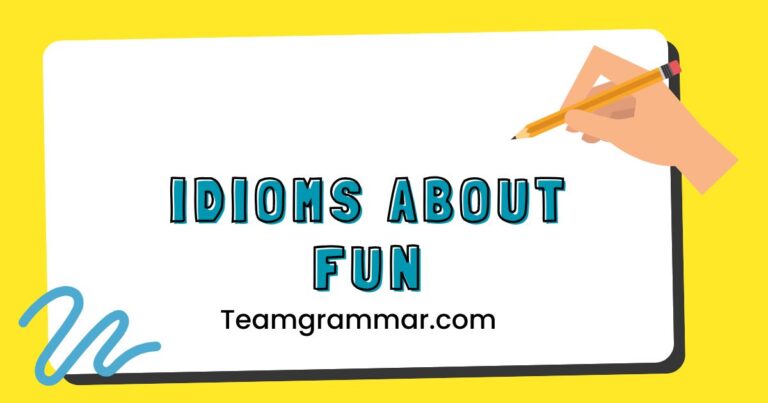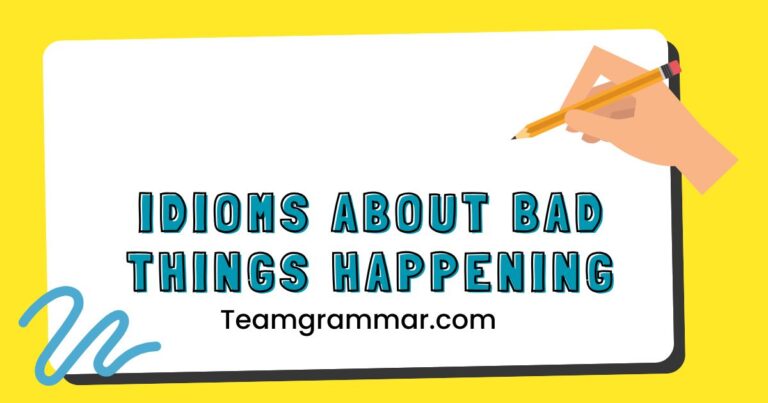41 Idioms for the Outdoors: Mastering Figurative Language
Understanding idioms is crucial for mastering English, especially when discussing specific themes like the outdoors. Idioms add color and depth to conversations, allowing for more nuanced and expressive communication.
This article provides a comprehensive guide to idioms related to the outdoors, enhancing your comprehension and fluency. Whether you are an ESL student, a language enthusiast, or simply looking to enrich your vocabulary, this guide will equip you with the knowledge to confidently use and understand these colorful expressions.
Table of Contents
- Introduction
- Definition of Idioms and Their Importance
- Structural Breakdown of Outdoor Idioms
- Types and Categories of Outdoor Idioms
- Examples of Outdoor Idioms
- Usage Rules for Outdoor Idioms
- Common Mistakes with Outdoor Idioms
- Practice Exercises
- Advanced Topics: The Nuances of Idiomatic Usage
- Frequently Asked Questions
- Conclusion
Definition of Idioms and Their Importance
An idiom is a phrase or expression whose meaning cannot be understood from the literal meanings of its individual words. Instead, the phrase has a figurative meaning that is known through common usage.
Idioms are essential for understanding the nuances of a language and communicating effectively, adding richness and color to everyday conversations and writing. They are particularly useful in expressing complex emotions or situations in a concise and relatable way.
Idioms can be classified based on their structure, function, and the context in which they are used. Structurally, idioms can range from simple phrases to more complex sentences.
Functionally, they serve various purposes, such as expressing emotions, describing situations, or providing advice. Contextually, idioms are often specific to certain cultures or regions, making their understanding crucial for effective communication.
Understanding idioms is also vital for interpreting literature, movies, and other forms of media. Many writers and speakers use idioms to add depth and authenticity to their work.
Without a solid understanding of idioms, one might misinterpret the intended meaning of a text or conversation.
Structural Breakdown of Outdoor Idioms
Outdoor idioms, like all idioms, comprise various structural elements that contribute to their unique figurative meanings. Understanding these elements can help learners grasp the underlying concepts and use them correctly.
These idioms often involve nouns, verbs, adjectives, and prepositions, combined in ways that deviate from their literal definitions.
Nouns: Many outdoor idioms feature nouns related to nature, such as “weather,” “animals,” “plants,” and “terrain.” These nouns provide the foundation for the figurative meaning of the idiom. For example, “weather the storm” uses the noun “storm” to represent enduring through a difficult situation.
Verbs:Verbs in outdoor idioms often describe actions or states related to the natural world. These verbs can convey a sense of movement, growth, or change.
For instance, “nip something in the bud” uses the verb “nip” to mean stopping something from developing.
Adjectives:Adjectives add descriptive qualities to the nouns and verbs in outdoor idioms, enhancing their figurative meanings. They can evoke specific images or emotions related to the outdoors.
For example, “as cool as a cucumber” utilizes the adjective “cool” to describe someone who is calm and composed.
Prepositions:Prepositions play a crucial role in connecting the different elements of outdoor idioms and establishing relationships between them. They can indicate location, direction, or time.
For example, “out of the woods” uses the preposition “out of” to signify escaping a difficult situation.
Types and Categories of Outdoor Idioms
Outdoor idioms can be categorized based on their thematic connections to different aspects of the natural world. These categories include weather-related idioms, nature-related idioms, animal-related idioms, terrain-related idioms and plant related idioms.
Each category offers unique insights into how language reflects our understanding and interaction with the environment.
Weather-Related Idioms
Weather-related idioms use elements like rain, sun, wind, and storms to convey various meanings related to life experiences. These idioms often describe emotional states, challenges, or opportunities.
Nature-Related Idioms
Nature-related idioms draw upon general natural phenomena to express ideas about growth, change, and the cycles of life. These idioms often reflect a sense of harmony or balance.
Animal-Related Idioms
Animal-related idioms employ the characteristics and behaviors of animals to describe human traits, actions, or situations. These idioms can be humorous, critical, or complimentary, depending on the animal and context.
Terrain-Related Idioms
Terrain-related idioms use features of the landscape, such as mountains, valleys, and paths, to represent challenges, opportunities, and journeys in life. These idioms often convey a sense of exploration or overcoming obstacles.
Plant-Related Idioms
Plant-related idioms utilize the growth, characteristics, and uses of plants to symbolize ideas about development, nurturing, and potential. These idioms often reflect themes of growth, resilience, and the cyclical nature of life.
Examples of Outdoor Idioms
This section provides a comprehensive list of outdoor idioms, categorized by their thematic connections. Each category includes examples with explanations to help you understand their meanings and usage.
Weather-Related Idioms
Weather idioms often relate to the ups and downs of life, using weather phenomena to symbolize challenges, opportunities, and emotional states. The table below shows several examples of weather-related idioms:
| Idiom | Meaning | Example Sentence |
|---|---|---|
| Weather the storm | To survive a difficult period. | The company managed to weather the storm of the economic recession. |
| Under the weather | Feeling unwell. | I’m feeling a bit under the weather today, so I’m staying home. |
| Every cloud has a silver lining | There is something good in every bad situation. | Even though she lost her job, she knew that every cloud has a silver lining and started her own business. |
| Chase rainbows | To pursue unrealistic goals. | He’s always chasing rainbows, dreaming of winning the lottery. |
| Come rain or shine | No matter what happens. | Come rain or shine, I’ll be there for you. |
| A storm in a teacup | A big fuss about something unimportant. | Their argument was just a storm in a teacup; they’ll be friends again soon. |
| Clear the air | To resolve a misunderstanding or tension. | We need to clear the air after that argument. |
| Get wind of something | To hear a rumor or piece of information. | I got wind of the new project from a colleague. |
| Head in the clouds | To be unrealistic or impractical. | She always has her head in the clouds, dreaming of becoming a famous actress. |
| Make hay while the sun shines | To make the most of an opportunity while it lasts. | We should make hay while the sun shines and finish the project early. |
| On cloud nine | Extremely happy. | She was on cloud nine after receiving the job offer. |
| When it rains, it pours | When bad things happen, they often happen all at once. | First, I lost my job, and then my car broke down; when it rains, it pours. |
| A fair-weather friend | Someone who is only a friend when things are good. | He’s a fair-weather friend; he disappears when you need him. |
| Calm before the storm | A period of peace before a period of chaos. | The calm before the storm made me uneasy. |
| In the doldrums | In a state of inactivity or stagnation. | The company has been in the doldrums for the past year. |
| Snowed under | Overwhelmed with too much work. | I’m completely snowed under with paperwork. |
| Take a rain check | To postpone something. | Can I take a rain check on dinner tonight? |
| Throw caution to the wind | To take a risk. | He decided to throw caution to the wind and invest all his savings in the new venture. |
| Waiting for the storm to pass | Waiting for a difficult situation to end. | We’re just waiting for the storm to pass before making any major decisions. |
| To be in a fog | To be confused or disoriented. | I was in a fog after waking up from the surgery. |
Nature-Related Idioms
Nature-related idioms often draw upon the broader aspects of the natural world, such as growth, change, and the interconnectedness of living things. The table below shows several examples of nature-related idioms:
| Idiom | Meaning | Example Sentence |
|---|---|---|
| A drop in the ocean | A very small amount compared to what is needed. | The money we raised was just a drop in the ocean compared to the total cost. |
| Tip of the iceberg | A small part of a larger problem. | The reported cases are just the tip of the iceberg; many more people are affected. |
| Go to seed | To decline in appearance or condition. | After years of neglect, the garden had gone to seed. |
| As old as the hills | Very old. | That joke is as old as the hills. |
| Back to nature | To return to a simpler, more natural way of life. | They decided to go back to nature and live off the land. |
| Creature comforts | Things that make life more pleasant. | He enjoys the creature comforts of his new home. |
| In the lap of luxury | Living in very comfortable conditions. | She grew up in the lap of luxury. |
| Mother Nature | The natural world and its forces. | Mother Nature can be very powerful. |
| Natural selection | The process by which the best-adapted organisms survive. | Natural selection favors the strongest animals. |
| The call of the wild | The attraction of nature and freedom. | He couldn’t resist the call of the wild and went hiking in the mountains. |
| A force of nature | Someone with great energy and power. | She’s a force of nature, always getting things done. |
| Up a creek without a paddle | In a difficult situation without the means to get out of it. | If we run out of gas, we’ll be up a creek without a paddle. |
| Clear as a bell | Very clear and easy to understand. | Her instructions were clear as a bell. |
| Still waters run deep | Quiet people often have deep thoughts and feelings. | He doesn’t say much, but still waters run deep. |
| Walking on thin ice | In a risky or dangerous situation. | He’s walking on thin ice after missing so many deadlines. |
| A sea change | A major transformation or shift. | The new management brought about a sea change in the company. |
| Rocky road | A difficult or challenging path. | Their relationship has had a rocky road. |
| Hit the ground running | To start something quickly and successfully. | She hit the ground running in her new job. |
| Make waves | To cause trouble or controversy. | He likes to make waves with his controversial opinions. |
| Touch base | To make contact with someone. | Let’s touch base next week to discuss the project. |
Animal-Related Idioms
Animal-related idioms often use the characteristics and behaviors of animals to describe human traits, actions, or situations. The table below shows several examples of animal-related idioms:
| Idiom | Meaning | Example Sentence |
|---|---|---|
| Busy as a bee | Very busy. | She’s been as busy as a bee preparing for the conference. |
| Eager beaver | A person who is enthusiastic and hardworking. | He’s such an eager beaver, always volunteering for extra tasks. |
| Cat got your tongue? | Why aren’t you talking? | Cat got your tongue? You’ve been quiet all evening. |
| Hold your horses | Wait a moment. | Hold your horses! Let’s think about this before we act. |
| Kill two birds with one stone | To accomplish two things at once. | By shopping on the way home, I can kill two birds with one stone. |
| Like a fish out of water | Feeling uncomfortable or out of place. | He felt like a fish out of water at the formal party. |
| Let sleeping dogs lie | To avoid stirring up trouble. | I decided to let sleeping dogs lie and not bring up the issue again. |
| Night owl | A person who stays up late. | He’s a night owl; he does his best work late at night. |
| Open a can of worms | To create a complicated problem. | Bringing up that issue would open a can of worms. |
| Smell a rat | To suspect something is wrong. | I smell a rat; something doesn’t seem right. |
| The world is your oyster | You have many opportunities. | You’ve graduated from college; the world is your oyster. |
| Top dog | The most important person. | He’s the top dog in the company. |
| Watch like a hawk | To watch very carefully. | The security guard watched like a hawk to prevent any theft. |
| Wolf in sheep’s clothing | Someone who appears harmless but is dangerous. | He’s a wolf in sheep’s clothing; don’t trust him. |
| Chicken out | To back out due to fear. | He was going to go bungee jumping, but he chickened out at the last minute. |
| Copy cat | Someone who copies others. | She’s such a copy cat, always imitating my style. |
| Dog days | The hottest days of summer. | The dog days of summer are almost here. |
| Elephant in the room | An obvious problem that no one wants to discuss. | The company’s financial troubles were the elephant in the room. |
| Fox in the henhouse | Someone untrustworthy in a position to do harm. | Putting him in charge of the finances was like putting a fox in the henhouse. |
| Guinea pig | A subject for an experiment. | We need a guinea pig to test the new software. |
Terrain-Related Idioms
Terrain-related idioms use features of the landscape, such as mountains, valleys, and paths, to represent challenges, opportunities, and journeys in life. The table below shows several examples of terrain-related idioms:
| Idiom | Meaning | Example Sentence |
|---|---|---|
| Hit rock bottom | To reach the lowest point in a situation. | After losing his job and his house, he hit rock bottom. |
| Over the hill | Too old to be effective or useful. | Some people might think he’s over the hill, but he’s still very talented. |
| Off the beaten path | In a remote or unusual place. | We wanted to go off the beaten path and explore some hidden gems. |
| Plain sailing | Easy and without problems. | Once we got the funding, it was plain sailing from there. |
| Around the bend | Crazy or insane. | He’s been working so hard that he’s going around the bend. |
| Cross that bridge when you come to it | Deal with a problem when it arises. | Let’s not worry about that now; we’ll cross that bridge when we come to it. |
| Downhill from here | Declining or getting worse. | After the initial success, it was downhill from here. |
| Get over the hump | To get past the most difficult part. | Once we get over the hump of the initial setup, it will be easier. |
| Make a mountain out of a molehill | To exaggerate a problem. | Don’t make a mountain out of a molehill; it’s not that serious. |
| On the level | Honest and truthful. | I trust him; he’s always on the level. |
| Smooth sailing | Easy progress. | After the initial challenges, it has been smooth sailing. |
| Take the high road | To act in a moral and honorable way. | Even though they were rude, she decided to take the high road. |
| Up the creek | In trouble or difficulty. | If we miss the deadline, we’ll be up the creek. |
| Valley of despair | A period of hopelessness or discouragement. | After the project failed, they were in the valley of despair. |
| At the end of the road | At the conclusion or limit. | We’re at the end of the road with this project. |
| Between a rock and a hard place | In a difficult situation with no good options. | I’m between a rock and a hard place; I don’t know what to do. |
| Climbing the walls | Feeling restless or anxious. | I’m climbing the walls with boredom. |
| Dig in your heels | To stubbornly resist. | He dug in his heels and refused to compromise. |
| Edge of the cliff | In a dangerous or precarious situation. | The company is on the edge of the cliff financially. |
| Foot of the mountain | At the beginning of a challenge. | We’re at the foot of the mountain with this project. |
Plant-Related Idioms
Plant-related idioms utilize the growth, characteristics, and uses of plants to symbolize ideas about development, nurturing, and potential. The table below shows several examples of plant-related idioms:
| Idiom | Meaning | Example Sentence |
|---|---|---|
| Barking up the wrong tree | To be mistaken or misguided. | If you think he’s the one who did it, you’re barking up the wrong tree. |
| Beat around the bush | To avoid talking directly about something. | Stop beating around the bush and tell me what you really think. |
| Branch out | To expand or diversify. | The company decided to branch out into new markets. |
| Nip something in the bud | To stop something from developing. | We need to nip this problem in the bud before it gets worse. |
| Take root | To become established. | The new ideas began to take root in the community. |
| Through the grapevine | To hear something through rumors. | I heard through the grapevine that he’s leaving the company. |
| Turn over a new leaf | To make a fresh start. | He decided to turn over a new leaf and quit smoking. |
| Under the rose | Secretly or confidentially. | The information was given to me under the rose. |
| Asleep at the switch | Not alert or attentive. | The guard was asleep at the switch, and the thief got away. |
| Cast pearls before swine | To offer something valuable to someone who doesn’t appreciate it. | Trying to explain art to him is like casting pearls before swine. |
| Down to earth | Practical and realistic. | She’s very down to earth and easy to talk to. |
| Early bird gets the worm | The person who arrives first has the best chance of success. | I got here early because the early bird gets the worm. |
| Fertile ground | A situation that is favorable for growth. | The new market is fertile ground for our product. |
| Get to the root of the problem | To find the cause of a problem. | We need to get to the root of the problem to fix it. |
| Have green fingers | To be good at gardening. | She has green fingers; her garden is beautiful. |
| In full bloom | At the peak of beauty or development. | The flowers are in full bloom in the spring. |
| Jump the gun | To start something too early. | He jumped the gun and announced the news before it was official. |
| Keep something green | To keep something fresh and new. | We need to keep the project green with new ideas. |
| Leaf through | To quickly read through something. | I leafed through the magazine while waiting. |
| Make a silk purse out of a sow’s ear | To make something good from something bad. | She managed to make a silk purse out of a sow’s ear with the limited resources. |
Usage Rules for Outdoor Idioms
Using idioms correctly involves understanding their specific meanings and contexts. It’s essential to consider the audience, the tone of the conversation, and the overall message you want to convey.
Here are some key rules to follow when using outdoor idioms:
- Understand the Meaning: Always ensure you know the correct meaning of the idiom before using it. Misusing an idiom can lead to confusion or miscommunication.
- Consider the Context: Use idioms that are appropriate for the situation. Some idioms may be too informal for professional settings.
- Know Your Audience: Be mindful of your audience’s familiarity with idioms. If you’re speaking to non-native English speakers, it may be best to avoid using too many idioms.
- Maintain Consistency: Avoid mixing literal and figurative language within the same sentence. This can create a confusing and awkward effect.
- Practice Regularly: The best way to master idioms is to practice using them in conversation and writing.
Idioms should be used to enhance communication, not to complicate it. When in doubt, it’s often better to use clear and straightforward language rather than forcing an idiom into a sentence where it doesn’t quite fit.
Overusing idioms can also make your speech sound unnatural or forced.
For example, instead of saying “We’re up a creek without a paddle if we don’t finish this project,” you could simply say, “We’ll be in serious trouble if we don’t finish this project.” The latter is more direct and easier to understand, especially for non-native speakers.
Common Mistakes with Outdoor Idioms
Even advanced English learners can make mistakes with idioms. These mistakes often stem from misunderstanding the idiom’s meaning, misusing its structure, or applying it in an inappropriate context.
Here are some common errors and how to avoid them:
- Literal Interpretation: Interpreting an idiom literally instead of figuratively.
- Incorrect Word Choice: Substituting words in the idiom with similar but incorrect terms.
- Misunderstanding Context: Using an idiom in a situation where it doesn’t apply.
- Overuse of Idioms: Using too many idioms in a single conversation, making it difficult to follow.
Let’s look at some specific examples of common mistakes and their corrections:
| Incorrect | Correct | Explanation |
|---|---|---|
| “He is feeling under the water.” | “He is feeling under the weather.” | The correct idiom is “under the weather,” meaning unwell. |
| “Every storm has a gold lining.” | “Every cloud has a silver lining.” | The correct idiom is “every cloud has a silver lining,” meaning there is something good in every bad situation. |
| “I’ll be there, come sun or rain.” | “I’ll be there, come rain or shine.” | The correct idiom is “come rain or shine,” meaning no matter what happens. |
| “She is chasing stars.” | “She is chasing rainbows.” | The correct idiom is “chasing rainbows,” meaning pursuing unrealistic goals. |
| “That’s a drop from the ocean.” | “That’s a drop in the ocean.” | The correct idiom is “a drop in the ocean,” meaning a very small amount compared to what is needed. |
By being aware of these common mistakes, you can avoid them and use outdoor idioms correctly and confidently. Always double-check the meaning and usage of an idiom if you are unsure.
Practice Exercises
Test your understanding of outdoor idioms with these practice exercises. Fill in the blanks with the correct idiom from the list provided.
Idiom List:
- Weather the storm
- Under the weather
- Every cloud has a silver lining
- Busy as a bee
- Kill two birds with one stone
- Like a fish out of water
- Hit rock bottom
- Off the beaten path
- Barking up the wrong tree
- Beat around the bush
- The company had to ___________ during the economic crisis to stay afloat.
- I’m feeling a bit ___________ today, so I’m going to take it easy.
- Even though she lost her job, she knew that ___________ and started her own business.
- She’s been as ___________ preparing for the conference.
- By picking up groceries on the way home, I can ___________.
- He felt ___________ at the fancy gala.
- After losing his job and home, he felt like he ___________ .
- They decided to travel ___________ and avoid the tourist traps.
- If you think I was involved, you’re ___________.
- Stop ___________ and tell me what you really think.
Answer Key:
- Weather the storm
- Under the weather
- Every cloud has a silver lining
- Busy as a bee
- Kill two birds with one stone
- Like a fish out of water
- Hit rock bottom
- Off the beaten path
- Barking up the wrong tree
- Beat around the bush
Exercise 2:
Choose the correct idiom to complete each sentence:
- If we don’t leave now, we’ll be ___________ when the tide comes in.
- up a creek
- over the hill
- on cloud nine
- Stop ___________ and tell me what you need.
- holding your horses
- beating around the bush
- waiting for the storm to pass
- After failing the exam, he felt like he had ___________.
- hit rock bottom
- taken a rain check
- made hay while the sun shines
- She felt ___________ at the formal event.
- on cloud nine
- like a fish out of water
- in the doldrums
- He’s always ___________, dreaming of unrealistic goals.
- waiting for the storm to pass
- chasing rainbows
- snowed under
- They managed to ___________ the financial crisis.
- weather the storm
- get wind of something
- clear the air
- She’s been ___________ preparing for the conference
- clear as a bell
- snowed under
- busy as a bee
- The company decided to ___________ into new markets.
- branch out
- take root
- turn over a new leaf
- I heard ___________ that he’s leaving the company.
- through the grapevine
- under the rose
- down to earth
- We need to ___________ this problem before it gets worse.
- nip in the bud
- jump the gun
- get to the root
Answer Key:
- a. up a creek
- b. beating around the bush
- a. hit rock bottom
- b. like a fish out of water
- b. chasing rainbows
- a. weather the storm
- c. busy as a bee
- a. branch out
- a. through the grapevine
- a. nip in the bud
Advanced Topics: The Nuances of Idiomatic Usage
Idiomatic usage goes beyond simple memorization and application. Mastering the nuances of idioms involves understanding their cultural roots, historical context, and subtle variations.
This section explores advanced topics related to idiomatic usage, helping you to achieve a deeper level of proficiency.
- Cultural Context: Many idioms are deeply rooted in cultural traditions and historical events. Understanding these roots can provide valuable insights into the idiom’s meaning and usage.
- Regional Variations: Idioms can vary significantly from one region to another. What is a common expression in one area may be unfamiliar or even nonsensical in another.
- Evolution of Idioms: Language is constantly evolving, and idioms are no exception. New idioms emerge over time, while others fade into obscurity.
- Creative Use of Idioms: Skilled writers and speakers often play with idioms, adapting them to create new meanings or humorous effects.
For example, the idiom “raining cats and dogs” is believed to have originated in 16th-century England, where poor drainage systems and thatched roofs led to animals seeking shelter in the roofs and being washed out during heavy rains. Understanding this historical context adds depth to the idiom’s meaning.
Another advanced technique is to combine or modify existing idioms to create new expressions. For instance, you might say “weathering the financial storm” to adapt the idiom “weather the storm” to a specific context.
Frequently Asked Questions
Conclusion
Mastering outdoor idioms can significantly enhance your understanding and use of the English language. By learning the meanings, structures, and usage rules of these colorful expressions, you can communicate more effectively and confidently in various settings.
Remember to consider the context, audience, and cultural nuances when using idioms, and practice regularly to improve your proficiency. With dedication and effort, you can unlock the richness and depth of idiomatic language and elevate your English skills to new heights.
Whether you’re weathering the storm or enjoying plain sailing, a strong command of idioms will help you navigate the complexities of communication with ease and flair.







